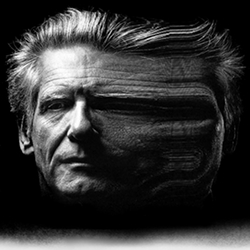
Review: The Counselor (2013)

Cast: Michael Fassbender, Penélope Cruz, Cameron Diaz, Brad Pitt
Director: Ridley Scott
Country: USA | UK
Genre: Crime | Drama | Thriller
Official Website: Here
Editor’s Notes: The Counselor opens wide theatrically today, October 25th.
“This is a cautionary stone. You will see,” the Counselor is told by a diamond dealer near the beginning of Ridley Scott’s flimsy neo-noir The Counselor. That line is symbolic, you see, for Scott’s cautionary tale that can’t grasp really any of novelist-turned-screenwriter Cormac McCarthy’s fancy moral lessons. The movie is a hollow mixture of the hard-boiled and slick, as usual with Scott.
Granted, The Counselor is directed with a kind of visual fluidity that does not make it at all a bore. Cut by Scott’s go-to editor Pietro Scalia, the film moves surprisingly well as it slides from one nihilistic scene to the next. Methodically divided in talky set pieces, which are occasionally interrupted by explosive violence, The Counselor is one of Scott’s more theatrical pieces, perhaps from the same corner of memory that inspired McCarthy’s play The Sunset Limited (its film adaptation directed by Tommy Lee Jones).
Granted, The Counselor is directed with a kind of visual fluidity that does not make it at all a bore. Cut by Scott’s go-to editor Pietro Scalia, the film moves surprisingly well as it slides from one nihilistic scene to the next.
But the theatricality becomes problematic since Scott is one of the weaker noir-flavored directors of human behaviour (see his mediocre talk fests American Gangster and Body of Lies). For example, The Counselor’s lengthy opening scene when the Counselor (Michael Fassbender) pleases girlfriend Laura (Penelope Cruz) under their bedsheets, is particularly dull. Scott haphazardly cuts from a closeup on Counselor to a reverse-closeup of Laura, yet there’s no flow or sexual tension. He’s just getting through the scene, limply setting up emotional interest in an otherwise emotionally vacant story.
Afterwards, the film follows the Counselor as his overconfidence (or as Rosie Perez’s convict character calls him in one scene: “A smart-ass.”) is upended when he partners with the leathery, spiky-haired Reiner (Javier Bardem) to partake in a drug deal with the Mexican cartel. In their first scene together, Reiner warns him of the inevitable consequences: “if you pursue this route you’ve embarked upon, you will come to moral decisions that will take you completely by surprise. You won’t see it coming at all.”

Ironically, Scott-McCarthy frame the story so the audience does see it coming. The Counselor’s overconfidence deliberately contradicts Scott’s knowing ominousness, and so Counselor’s demise plays at the end as punishment, plus with the strings of Daniel Pemberton’s score there’s an underlying mawkishness. This would be fine if Scott had more to say, but he infuses The Counselor with a shallow thread of one-noted cynicism. “Moral decisions”? What decisions? Scott dramatizes with action/behaviour-oriented plot, not character-driven dilemmas.
That’s the disconnect: Scott and McCarthy are not compatible storytellers. Sure – Scott also exercises in bleak mood and attitude, but that’s the most minor component of McCarthy’s works. The latter deals at a more poetic level with circumstance, ellipses, and unconventional twists. These technical tools design, in a very human way, McCarthy’s unjust West. The Counselor does include these elements, especially with the elliptical portrayal of the cartel (who are all anonymously characterized – an effective tool), but Scott films them so literally as plot points. They are diminished to simply a sum of events, rather than a heavy feeling that weaves through the images.
This aspect represents The Counselor’s central flaw. Note that it is not an insipid film, because let’s face it most of us love flamboyance and attitude in the movies, and Scott’s new one is a vessel of them. Scott is at least capable of his TV-styled plots, so he does not stumble about with abstract pretensions like Steven Soderbergh does in his visually dim art-house dramas. The Counselor, on the other hand, is colorfully lit and shot by cinematographer Dariusz Wolski (Prometheus), who crisply captures the mix of opulence and despair in the variation of interiors and exteriors (from lush polo fields to overcast deserts).
But The Counselor is undercut by its own narrative drive, which lends its wheels to the duplicitous Malkina (Cameron Diaz). She’s a walking contrivance masquerading as femme fatale who outwits the entire cast like Marion Cotillard’s character (almost) did in The Dark Knight Rises.
But The Counselor is undercut by its own narrative drive, which lends its wheels to the duplicitous Malkina (Cameron Diaz). She’s a walking contrivance masquerading as femme fatale who outwits the entire cast like Marion Cotillard’s character (almost) did in The Dark Knight Rises. She personifies evil, indicative of Ridley’s known specialty: monstrous villains (think H.R. Giger’s alien in Alien, Anthony Hopkins in Hannibal, and Joaquin Phoenix in Gladiator). Sadly, Malkina is responsible for The Counselor’s most worthless scenes: one in a church and the final conversation, which ends on one of the stupidest cuts to black in awhile.
Probably the best character in The Counselor is Westray, played by Brad Pitt who is one of the better stars at playing masculine extremes (from the mercenary hit man in Killing Them Softly to the compassionate carpenter in the recent 12 Years A Slave). His banter with Fassbender’s Counselor particularly lands, as the two actors perfectly embody classic noir male characters: one who knows a lot about the wicked world of crime (Pitt) and the other who thinks he knows a lot but in fact knows very little (Fassbender).
The Counselor, therefore, is not dreadful. It has solid moments, and Scott can move the camera with a reasonable amount of skill. But his films, at least lately, feel perfunctory: slick style at the service of shallow content. He keeps character motivations so murky, perhaps to manufacture paranoia but it generates a kind of facetiousness behind the story. The Counselor is a movie you can admit to having enjoyed for its slickness, but not its “deeper” claims – there’s not a lot there. It doesn’t earn, as the Counselor describes to Westray, its “cautionary nature”.
Related Posts
![]()
Parker Mott
![]()
Latest posts by Parker Mott (see all)
-
Bryan Murray





























